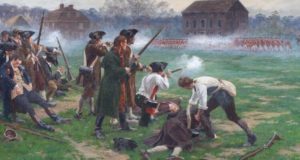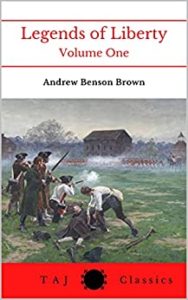Andrew Benson Brown and the Epic Poem
Andrew Benson Brown has taken some of the signature events of the early American Revolution and turned them into an epic poem. But there’s a twist.
This is an American Revolution that sounds familiar, vaguely, but isn’t quite what you’ll find in the history books. Thomas Jefferson is sent to hell for some unknown sin and is guided through the underworld by none other than Dante. Paul Revere makes his famous ride on the fastest horse on earth. It’s not just the shot heard round the world at Lexington and Concord; it may have been fired by a British soldier and any of a number of other claimants. And if at first you think the story of farmer Sam Whittemore is made up, well, think again! I have a new octogenarian hero.

Battle of Lexington by William Barnes Wollen (public domain)
Brown’s Legends of Liberty: Volume One isn’t like any historical poem you’ve read before. A combination of rhymed poetry and illustrations (with stanzas printed right on many of them), this is part epic, part mock-epic, part historical fact, part historical invention, a strong dollop of the tongue-in-cheek, and all sheer fun. And underneath it all, Brown seems to be making a serious point.
The epic is divided into five parts: Invocation, which suggests the American Revolution is on a par with Greek mythology; Thomas Jefferson in Hell; The New-World Mercury (Paul Revere); The Shot Heard Round the Universe (Lexington and Concord); and The Old Man of Menotomy (Sam Whittemore). Brown combines facts, legends, and imagination to tell the story of the revolution’s earliest days of conflict in a simply wonderful way.
Consider the story of Samuel Whittemore. The basic facts of the story as recounted in the poem are all true. After the battle at Lexington, a 78-year-old farmer in Menotomy, Massachusetts, named Samuel Whittemore (born in 1696) takes up arms all on his own. He confronts the British with a sword, a brace of pistols, a rifle, and a hoe. And he manages to kill several before being brought down by enemy fire.
From “The Old Man of Menotomy”

This old knight blew his mantelpiece and wore
Its veiling dust cloud like a coat of mail.
He weighed his limbs with arms from days of yore:
The sword, the rifle long, the brace of pistols …
And then, for reasons vague, he grabbed his hoe
That sparked as if caked with precious crystals.
He tied it to his back, prepared to go
Heed glory’s call—it wasn’t yet too late
For this elastic man of seventy and eight.
Sam is eventually taken down, shot and cudgeled when he keeps firing after being wounded. As bodies are collected for burial, the attending physician discovers that Sam is still alive. He not only recovers from his wounds; he also lives to the ripe old age of 96. And this is verified by the New England Historical Society. You can’t make this up.
Which, I believe, is the point Brown is trying to make, the same one articulated (and quoted at the beginning of the volume) by a granddaughter of a veteran of the Battles of Lexington and Concord: “I used to put my finger on these scars, as he told me just how the ball went. We needed no fairy tales in our youth. The real experiences of our own people were more fascinating than all the novels ever written” (Pamela Brown Fiske, granddaughter of Francis Brown). What happened between 1775 and 1781 (the war officially ended in 1783 with the Treaty of Paris) is the stuff of legend and myth, much of it true, and all of it worth remembering and memorializing.
As for the poet himself, here’s what I’ve been able to find. He works as a children’s caseworker in rural Missouri. He was in graduate school when he came face to face with the reality of debt. He says he “reads obscure classics, writes things of little market value, and exercises for more than is befitting for a modern intellectual.”
And he writes wonderfully entertaining poetry.
Photo by James Johnstone, Creative Commons, via Flickr. Post by Glynn Young.
How to Read a Poem uses images like the mouse, the hive, the switch (from the Billy Collins poem)—to guide readers into new ways of understanding poems. Anthology included.
“I require all our incoming poetry students—in the MFA I direct—to buy and read this book.”
—Jeanetta Calhoun Mish
- “Your Accent! You Can’t Be from New Orleans!” - October 9, 2025
- Poets and Poems: Donna Vorreyer and “Unrivered” - October 7, 2025
- Poet Sidney Lanier and the Lost Cause - October 2, 2025


Leave a Reply